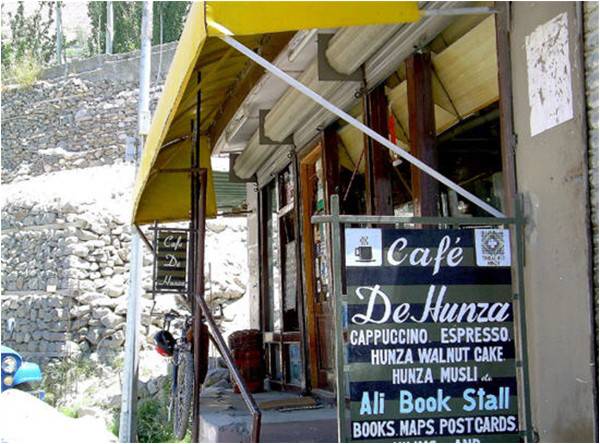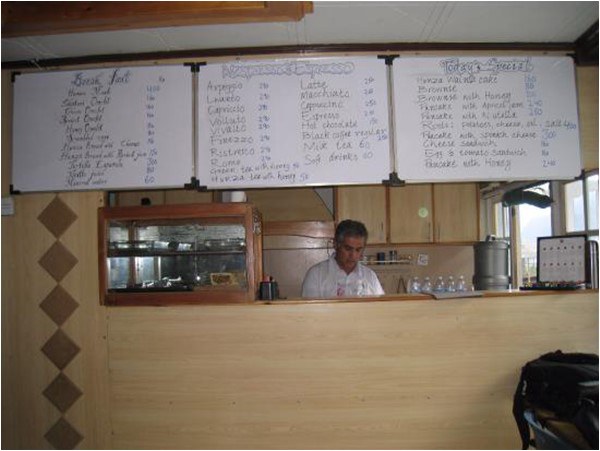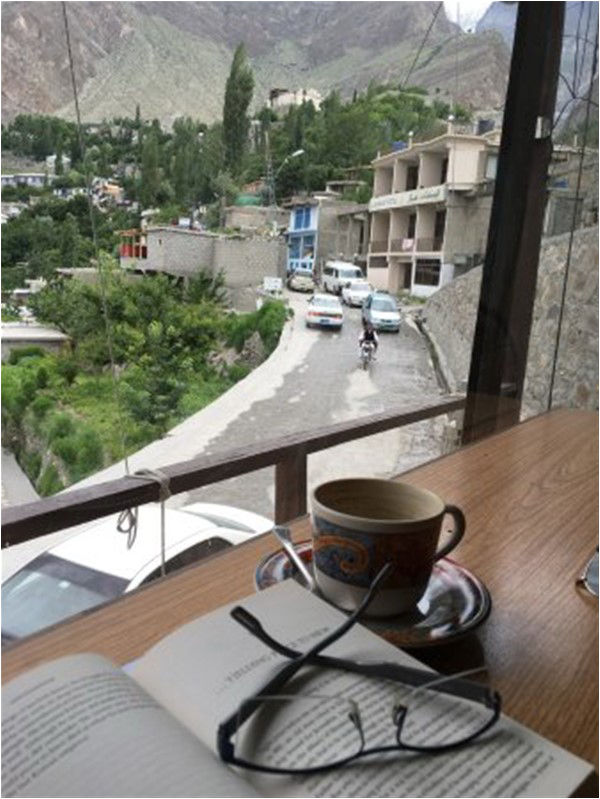
The Gilgit-Baltistan region of Pakistan attracts a substantial amount of adventure and cultural tourism to the country every year. In fact according to the G-B Minister for Tourism, Sports and Culture, the area is anticipating at least 1.2 million visitors in 2017 alone. Karimabad, the picturesque little capital of Hunza Valley on the Gilgit side is one of the classic points of convergence for most of these domestic and foreign tourists. Adventure tourists refuel on the way to more extreme environs, cultural tourists come to seek century old treasures like the Baltit and Altit forts and some just go to binge on the most delightful organic apricots in the country.
Most have also come to recognise Cafe De Hunza as the landmark where many significant social transactions happen. You can have a coffee and meet people, congregate before leaving for a trek, get some great locally produced apricot oil and sometimes even keep an ear to the pavement while looking for a ride to an area or trek you want to get to. It is the Craigslist or Uber of Karimabad, if you will.
My first encounter with this beloved place was on the way to the south side of Nanga Parbat with my undergraduate adventure society in 2001. Things were different then. Before the more convenient roads, before Daewoo expresses from Rawalpindi to Gilgit; you often got there in more trying circumstances. There were rickety roads, landslides and, often, when you got there in the middle of the night, the whole place was asleep. You took the last torturous bend up and were suddenly standing in a dark main street. You tossed your equipment in the front of a hotel and some senior asked, “Is his light on?” and then someone else bellowed “Yes, yes, it is!”
It was 2 am at the time. “What light could they possibly be talking about?” thought the trekking novice so many years ago now.?
“Shafqat bhai’s light is on”.

At that moment, I didn’t know this meant that the best cafe in the north was still open. Shafqat Ali (or Shafqat Bhai as he was known to his regulars) had kept the cafe open because he knew the regular May trip (spring break Pakistani style) from LUMS was coming and it had run late. That was my first impression of Karimabad: a kindly (then) young man standing behind the counter smiling at the throng of hungry, cranky misfits that had just wandered in like it was their uncle’s home - demanding coffee, cakes and waffles like family would. And he showed us the patience of family, staying up and sharing a coffee till dawn. He never told a patron to leave. His doors only closed when the last customer wandered out.
The cafe itself was also as unique as its owner. It transported you to another world. There was a wooden bar overlooking the valley, and piles and piles of books and maps there just to be shared. There were pancakes and waffles, coffee and hot chocolate, Rosti and grilled cheese sandwiches; all being cheekily served in the north of Pakistan where chicken Karahi is a staple, daal is sacred and naan has monopoly.
Sadly, the generous owner of this iconic place passed away of cardiac arrest on the 3rd of June, 2017, setting off a chain reaction of broken hearts amongst those who knew him in various corners of the world. Shafqat Bhai was a treasured part of Karimabad as well as the tourism associated with it. Crowds of people who have visited the town can’t remember leaving without one last coffee overlooking the valley from his wooden bar. Hence when a tourist from South Korea claims on Tripadvisor that Cafe De Hunza was the “Only place to get real coffee in Hunza”, someone who has never been to the Gilgit-Baltistan region might believe that is quite an overstatement. However, throughout my? almost? 20-year love affair with this wonderful little gem of peace, I have heard this repeatedly echoed by local university students, seasoned international trekkers, alpinists and cultural tourists from all over the world.

Mr. Ali was not originally from Karimabad, hailing from the nearby village of Haiderabad. He founded the cafe in 1999 to help fill the gap the exists when trekkers and mountaineers come down looking for simple food like panini and baked potatoes. Over the years as his cafe found a permanent home in Karimabad, he commuted each morning from the next village over to brew the first cup every morning himself.
And even as times changed, and customers changed, Bhai remained the same while he got with the program. His coffee making equipment got better, but the love he put in it remained the same. As more patrons were drawn to this sanctuary and energy needs increased, he installed a solar water heater on his roof. When he saw more people using laptops rather than the postcards – which used to be needed in abundance – he provided free wifi for his customers. But free wifi was only free if you sat down and had a coffee every single day, because he changed his password every day. Once, while living at a hotel across the street for a couple of weeks while doing some research I asked him why he kept changing it. With his wry twinkling smile, this savvy man answered, “Then why would you come get coffee every day and not just steal my internet from across the street?” When I replied, “Then who would give me ‘the best coffee in Hunza’?” he only grinned and gave me a slap on the back.
Over the years I saw it along with other well-wishers evolve from a two-story cafe-cum-library to half a floor of cafe with half a floor selling local arts and crafts in the later years – perhaps due to the lack of steady customers. The prevalent security issues saw to that legacy withering away. The books that were left there by tourists to be read and discovered by others dwindled over the years. I am sure he was also painfully aware that the new breed of customer coming in was reading less, and leaving behind even less. The only thing increasing was probably the selfies being taken next to his iconic blackboard menu advertising some of the best walnut cake in Hunza. I often had requests from friends to bring back some of that rich yet delicate cake filled with locally grown, organic walnuts.?
To the regulars he has accumulated over the years, the people that passed by season after season, Shafqat Bhai was Cafe De Hunza. And to many a weary traveler looking for a sanctuary, Cafe De Hunza was Karimabad. And even though he was always a delight to talk to talk to, his eyes would dart across the room, ever vigilant that somebody else might need his attention. He had mastered the secret of talking to a customer like an old friend one moment and gracefully attending to another in the next.
He also probably knew another secret or two, having served coffee to both locals and exhausted wanderers for decades, but nothing other than his clever smile belied any of that.
Now both the cafe and its enigmatic owner have taken all their secrets with them. Chief among them: the secret to providing a safe haven for discussion, intercultural communication and a lot of lighthearted humour in the middle of a war on the very same.?
Shafqat Bhai has passed away and we can all only pray and thank him for the space he always gave travelers to talk, to eat, to read books we sometimes never intended to buy and to lounge on cushions on the floor when there was no space left on the tables. There was always room in his heart even when the physical room in the cafe ran out.
Now, with is passing, that light finally went out in Cafe De Hunza. It's the end of an era. Karimabad is no longer the same for many of us but his new place in heaven is where I will go and have a coffee on the last day of earth.
Most have also come to recognise Cafe De Hunza as the landmark where many significant social transactions happen. You can have a coffee and meet people, congregate before leaving for a trek, get some great locally produced apricot oil and sometimes even keep an ear to the pavement while looking for a ride to an area or trek you want to get to. It is the Craigslist or Uber of Karimabad, if you will.
There was a wooden bar overlooking the valley, and piles and piles of books and maps there just to be shared. There were pancakes and waffles, coffee and hot chocolate, Rosti and grilled cheese sandwiches
My first encounter with this beloved place was on the way to the south side of Nanga Parbat with my undergraduate adventure society in 2001. Things were different then. Before the more convenient roads, before Daewoo expresses from Rawalpindi to Gilgit; you often got there in more trying circumstances. There were rickety roads, landslides and, often, when you got there in the middle of the night, the whole place was asleep. You took the last torturous bend up and were suddenly standing in a dark main street. You tossed your equipment in the front of a hotel and some senior asked, “Is his light on?” and then someone else bellowed “Yes, yes, it is!”
It was 2 am at the time. “What light could they possibly be talking about?” thought the trekking novice so many years ago now.?
“Shafqat bhai’s light is on”.

At that moment, I didn’t know this meant that the best cafe in the north was still open. Shafqat Ali (or Shafqat Bhai as he was known to his regulars) had kept the cafe open because he knew the regular May trip (spring break Pakistani style) from LUMS was coming and it had run late. That was my first impression of Karimabad: a kindly (then) young man standing behind the counter smiling at the throng of hungry, cranky misfits that had just wandered in like it was their uncle’s home - demanding coffee, cakes and waffles like family would. And he showed us the patience of family, staying up and sharing a coffee till dawn. He never told a patron to leave. His doors only closed when the last customer wandered out.
The cafe itself was also as unique as its owner. It transported you to another world. There was a wooden bar overlooking the valley, and piles and piles of books and maps there just to be shared. There were pancakes and waffles, coffee and hot chocolate, Rosti and grilled cheese sandwiches; all being cheekily served in the north of Pakistan where chicken Karahi is a staple, daal is sacred and naan has monopoly.
Sadly, the generous owner of this iconic place passed away of cardiac arrest on the 3rd of June, 2017, setting off a chain reaction of broken hearts amongst those who knew him in various corners of the world. Shafqat Bhai was a treasured part of Karimabad as well as the tourism associated with it. Crowds of people who have visited the town can’t remember leaving without one last coffee overlooking the valley from his wooden bar. Hence when a tourist from South Korea claims on Tripadvisor that Cafe De Hunza was the “Only place to get real coffee in Hunza”, someone who has never been to the Gilgit-Baltistan region might believe that is quite an overstatement. However, throughout my? almost? 20-year love affair with this wonderful little gem of peace, I have heard this repeatedly echoed by local university students, seasoned international trekkers, alpinists and cultural tourists from all over the world.

Mr. Ali was not originally from Karimabad, hailing from the nearby village of Haiderabad. He founded the cafe in 1999 to help fill the gap the exists when trekkers and mountaineers come down looking for simple food like panini and baked potatoes. Over the years as his cafe found a permanent home in Karimabad, he commuted each morning from the next village over to brew the first cup every morning himself.
And even as times changed, and customers changed, Bhai remained the same while he got with the program. His coffee making equipment got better, but the love he put in it remained the same. As more patrons were drawn to this sanctuary and energy needs increased, he installed a solar water heater on his roof. When he saw more people using laptops rather than the postcards – which used to be needed in abundance – he provided free wifi for his customers. But free wifi was only free if you sat down and had a coffee every single day, because he changed his password every day. Once, while living at a hotel across the street for a couple of weeks while doing some research I asked him why he kept changing it. With his wry twinkling smile, this savvy man answered, “Then why would you come get coffee every day and not just steal my internet from across the street?” When I replied, “Then who would give me ‘the best coffee in Hunza’?” he only grinned and gave me a slap on the back.
Over the years I saw it along with other well-wishers evolve from a two-story cafe-cum-library to half a floor of cafe with half a floor selling local arts and crafts in the later years – perhaps due to the lack of steady customers. The prevalent security issues saw to that legacy withering away. The books that were left there by tourists to be read and discovered by others dwindled over the years. I am sure he was also painfully aware that the new breed of customer coming in was reading less, and leaving behind even less. The only thing increasing was probably the selfies being taken next to his iconic blackboard menu advertising some of the best walnut cake in Hunza. I often had requests from friends to bring back some of that rich yet delicate cake filled with locally grown, organic walnuts.?
To the regulars he has accumulated over the years, the people that passed by season after season, Shafqat Bhai was Cafe De Hunza. And to many a weary traveler looking for a sanctuary, Cafe De Hunza was Karimabad. And even though he was always a delight to talk to talk to, his eyes would dart across the room, ever vigilant that somebody else might need his attention. He had mastered the secret of talking to a customer like an old friend one moment and gracefully attending to another in the next.
He also probably knew another secret or two, having served coffee to both locals and exhausted wanderers for decades, but nothing other than his clever smile belied any of that.
Now both the cafe and its enigmatic owner have taken all their secrets with them. Chief among them: the secret to providing a safe haven for discussion, intercultural communication and a lot of lighthearted humour in the middle of a war on the very same.?
Shafqat Bhai has passed away and we can all only pray and thank him for the space he always gave travelers to talk, to eat, to read books we sometimes never intended to buy and to lounge on cushions on the floor when there was no space left on the tables. There was always room in his heart even when the physical room in the cafe ran out.
Now, with is passing, that light finally went out in Cafe De Hunza. It's the end of an era. Karimabad is no longer the same for many of us but his new place in heaven is where I will go and have a coffee on the last day of earth.

